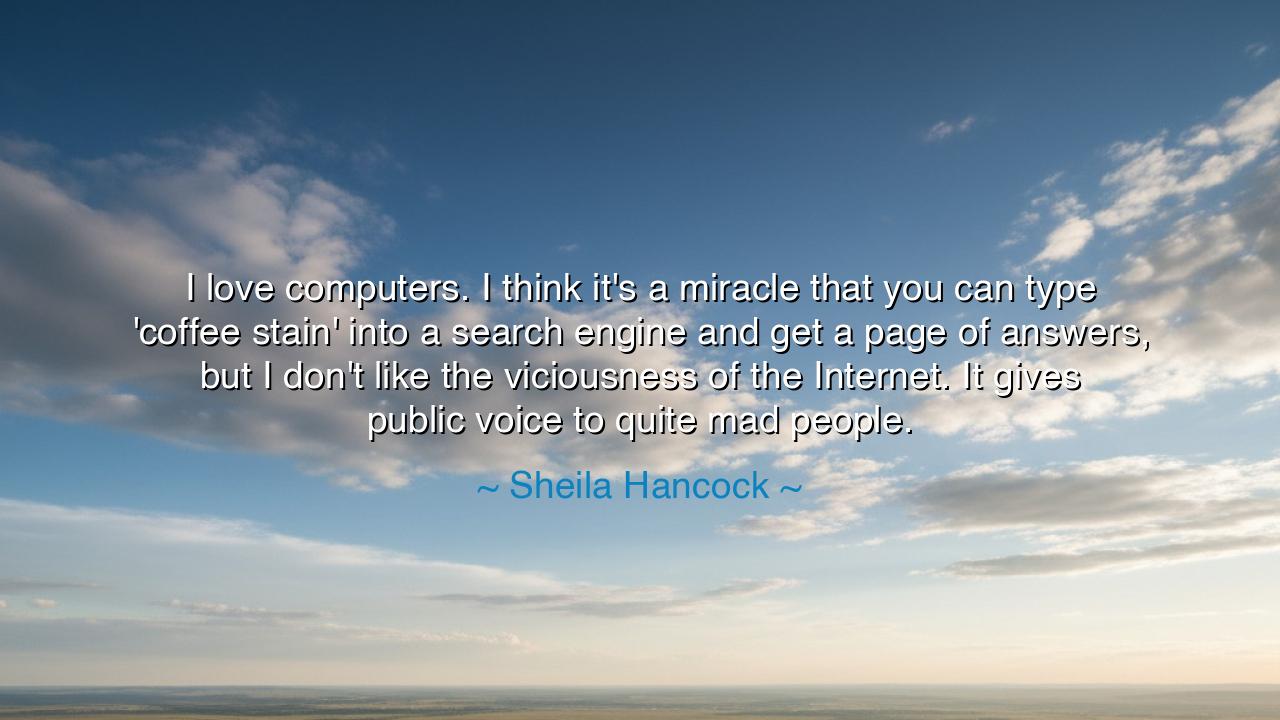
I love computers. I think it's a miracle that you can type
I love computers. I think it's a miracle that you can type 'coffee stain' into a search engine and get a page of answers, but I don't like the viciousness of the Internet. It gives public voice to quite mad people.






The words of Sheila Hancock, wise and seasoned in the theatre of life, speak with both wonder and sorrow: “I love computers. I think it’s a miracle that you can type ‘coffee stain’ into a search engine and get a page of answers, but I don’t like the viciousness of the Internet. It gives public voice to quite mad people.” In these words lies the paradox of our age — the miracle of connection woven with the poison of cruelty, the light of knowledge dimmed by the shadow of unguarded tongues. It is as if humankind has forged a new sun, only to find it burns as much as it shines.
In the dawn of ages, when men first discovered the art of speech, the elders warned: “Words are fire.” A kind word warms the heart; a cruel one burns the soul. The Internet, that vast and shimmering web, is a new forge of fire — and we, its smiths. To type a question and summon wisdom from the ether, to find remedies, guidance, or laughter with a few keystrokes — this is indeed a miracle. We have become gods of inquiry, capable of conjuring knowledge from the void. Yet the same flame that enlightens also scorches; for the Internet gives voice to all, even to those who speak with venom or madness, those who wound with words as others once did with swords.
Behold how easily the sacred gift of communication can turn profane. In the ancient forums of Athens, philosophers gathered to debate truth, guided by reason and respect. But in the new digital agora, where anonymity masks the face, many speak not to seek truth but to destroy it. They mock, they rage, they slander — and in doing so, they pollute the well of discourse from which all drink. Sheila Hancock sees this clearly: the Internet has given every man a stage, yet few have learned the art of worthy speech.
Consider the tale of Socrates, the wisest of men, who faced trial not for crime, but for his words. He questioned, he taught, he provoked reflection — and yet the crowd, inflamed by rumor and resentment, demanded his death. Even in the age of parchment and stone, the madness of the mob was real. How much more potent is it now, when words travel faster than light, when a whisper can become a storm? The digital mob, armed with keystrokes instead of torches, can ruin a life before truth awakens.
Yet let us not despair. For every voice that curses, there is another that heals. The same Internet that spreads cruelty also spreads compassion. It has carried prayers across oceans, united families long divided, and taught children in far corners of the world. The miracle remains; the flame still burns bright. But the ancients would remind us: “To master fire, one must learn restraint.” So too must we learn to master this new fire of communication, lest it consume us in its unbridled blaze.
The lesson, then, is twofold: Reverence and Responsibility. Use the web as you would a temple — enter with purpose, speak with care, and leave behind light, not ashes. If you read the words of the cruel, do not answer cruelty with cruelty; instead, let silence or wisdom be your reply. As the old sages taught, “He who wrestles with a madman becomes mad himself.” Do not let the madness of the Internet make a stranger of your soul.
In your daily life, remember the wonder that first inspired this digital world. Let your searches lead you to learning, not to hate. Create beauty where others spread chaos. Be a guardian of words — for every comment, every message, every post is a seed cast into the soil of eternity. Ask yourself before you speak: Will this grow into light, or into shadow?
And so, dear listener, hold fast to Sheila Hancock’s wisdom: love the miracle, but guard against the madness. Let your words, whether online or spoken, be like healing rain, not scorching flame. For though the Internet gives a voice to all, it is the wise — the compassionate, the thoughtful, the disciplined — who make that voice worthy of being heard.






AAdministratorAdministrator
Welcome, honored guests. Please leave a comment, we will respond soon